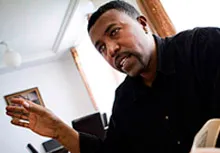It feels like it happened just yesterday. It was 7 a.m. on an average day in September in Asmara, Eritrea. My brain was still reshuffling the information I had gathered about the terrorist attacks on the World Trade Center a week earlier. I was writing an article on it for the next issue of Setit, the twice-weekly newspaper of which I was editor-in-chief.
I was in bed when my wife turned on the radio to listen to the morning news. “Starting today, September 18, 2001, the government has ordered all private presses to stop their publications.” The disturbing words of the presenter of Dimtsi Hafash Radio, the government station, suddenly froze my train of thoughts. The official statement went on to accuse us of violating press laws and ignoring the warnings we had been given. I felt as if I was dreaming. I didn’t move my head. I was still under the blanket.
In those days, our country, jammed between Ethiopia and Yemen on the shores of the Red Sea, was Africa’s youngest nation with a private press that was even younger. Like America, Eritrea had fought a war of independence (ours was 30 years long), and enacted a constitution guaranteeing a free press. Some of us in the media were former fighters in the liberation struggle or in the bloody conflict with Ethiopia that had ended a year earlier. As a result, many of us looked to the future with great hopes and a dream of seeing a democratic government established in our beloved country. For instance, I remember all of us writing in our editorials about the implementation of the constitution one week, fighting corrupt generals another, and the government’s policy of compulsory work imposed on Asmara University students the week after that.
However, because we had challenged the government or its policies, we were facing increasing hostility and enduring police harassment. By September 2001, the once-united ruling elite who led us to independence with the promise of democracy split over rebel leader President Isaias Afeworki’s resistance to the fulfillment of this promise: the implementation of our constitution. We covered both sides of this debate in the columns of our newspapers.
That September morning, I saw the last edition of my newspaper being sold on the street as I drove downtown and uptown through Asmara. I spoke with my sources and learned some more shocking news: Eleven senior officials who had criticised the president in an open letter published in Setit had been thrown in jail!
At our office, the staff was sitting in the front yard debating that morning’s developments.
The oldest member of our staff, and a talented writer, Fessehaye Yohannes (who is also known as Joshua) was optimistic, like most. “They just shut us down because they don’t want us to write about the jailed senior officials. They will let us continue our work once the issue is settled,” he said. I did not believe that, but I hoped he was right.
Around noon, I met with Matewos Habteab, editor of Meqaleh newspaper, and Amanuel Asrat, editor of Zemen newspaper at Rendez-Vous, a café near Asmara’s Cinema Roma, a relic of Italian colonial, art deco architecture. We were friends and had strengthened our friendships while we were enrolled at the University of Asmara. Matewos, who studied mathematics, and Amanuel, who studied soil and water conservation, were also great contributors to my newspaper before they launched their own. Now we were confronted with the most critical moment of our young journalistic careers. We needed each other’s advice more than at any other time.
As Matewos and I shared tea and Amanuel sipped an espresso macchiato, we agreed to take extra precautions and resolved to write a letter to the Ministry of Information to demand clarifications about the specific reasons for the government’s decision to close our newspapers. Medhanie Haile, deputy editor of KesteDebena, Yusuf Mohamed Ali, editor of Tsigenay, and Saïd Abdelkader, the editor of Admas, joined us and signed the letter too. Amanuel and I handed the letter to the Ministry of Information on September 21, 2001. I didn’t know it would be the last time I would see all these talented editors.
Luckily, I was not at home on September 23, the night the security agents came to arrest me. But my colleagues were arrested that night. Four of them—Fessehaye Yohannes, Yusuf Mohamed Ali, Saïd Abdelkader and Medhanie Haile—have already died in prison and we know nothing about where the rest are. That’s heartbreaking.
Unlike my colleagues, I still have a chance to practice journalism. Canada has allowed me to do what my country denied me. I have started a community newspaper, Meftih, to serve Eritrean Canadians and help them integrate into Canadian society. There is no government interference or police harassment here and there is respect for the rule of law. In Eritrea, it’s not the law that rules, it’s one person that rules the law. I hope that one day my country will enjoy the blessings that I experience here in Canada and that my colleagues will be eventually set free.
Aaron Berhane, former editor-in-chief of Eritrea’s now-banned largest private newspaper, Setit, is the publisher of Meftih newspaper in Canada.
